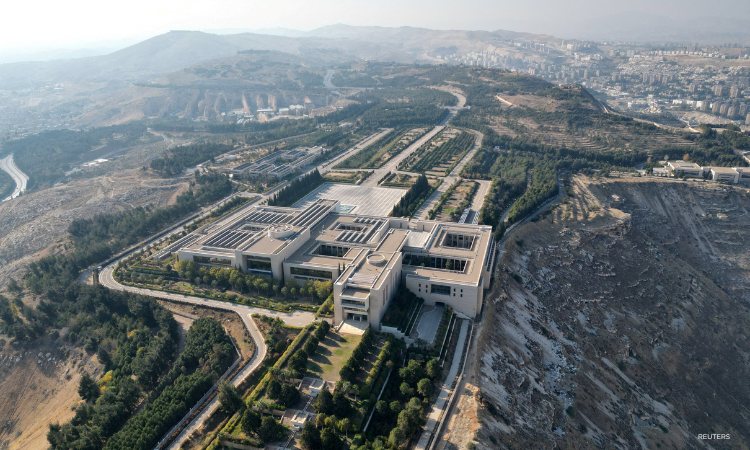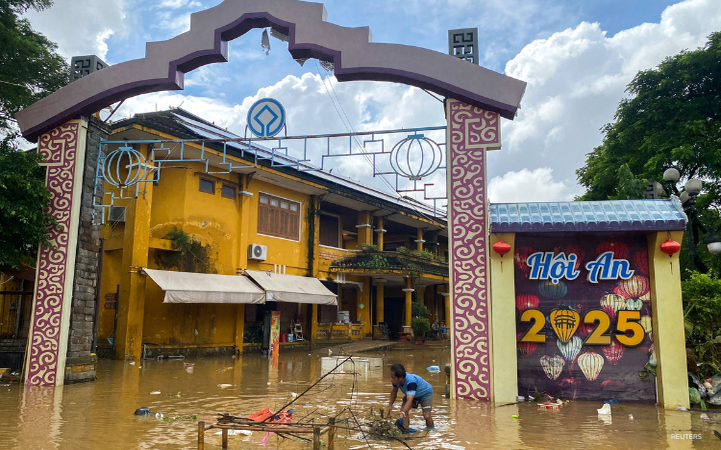No spoils of war: Syria's new ruler lays down the law to loyalists
Damascus, Syria - "I didn't know the salaries the government pays were this high!" Syrian President Ahmed al-Sharaa joked after more than 100 loyalists arrived at his former rebel base, many pulling up in luxury SUVs.
"Have you forgotten you are the sons of the revolution?" Sharaa rebuked the gathered officials and business leaders, according to two people present, remarking upon the large number of Cadillac Escalades, Range Rovers and Chevrolet Tahoes parked outside. "Have you been tempted so quickly?"
Syria's militant commander-turned-ruler has faced a turbulent 10 months since toppling President Bashar al-Assad after 14 years of civil war. The country has suffered sporadic bouts of sectarian violence involving ex-rebel factions linked to his new government, leaving more than 2,000 people dead, and there's been a spate of forced evictions and property seizures.
The meeting on August 30, which hasn't been reported before, took place at Sharaa's former headquarters in Idlib province in northwestern Syria, far from his official presidential offices in Damascus. The leader, a one-time al Qaeda commander, was flanked by two senior security officials as he spoke.
Sharaa ordered civil servants with luxury cars to hand over the keys or face being investigated for illicit gains, according to the two attendees as well as two civil servants briefed on the address, who all requested anonymity to discuss confidential matters. A handful of keys were handed in as people filed out at the end, the attendees told Reuters.
The message delivered to loyalists points to a critical challenge facing the 43-year-old president, according to Syrian officials and analysts: how to pivot from an insurgency to a civilian government without replicating the endemic corruption of Assad's reviled police state.
At stake: the legitimacy Sharaa has gained among many Syrians, and abroad, by ousting the dictator.
"Sharaa lacks any institutional framework or textbooks to rely on," said Hossam Jazmati, a Syrian researcher on Islamist groups who has studied the former warrior-sheikh for more than a decade.
"He's not a product of a state institution but of a faction. Since 2003, he has operated within a militia environment," he said. "Power was based on alliances, favouritism and monopoly.
Now, loyalists taking spoils of war would threaten his ability to consolidate power, Jazmati said: "He requires substantial financial resources to sustain his administration — not necessarily for personal gain, but to maintain authority."
Syria's Ministry of Information told Reuters that Sharaa had arranged a "friendly, informal meeting" in Idlib with former commanders, officials and other notables which touched on political and security challenges as well as the need to change the "investment culture established by the former regime".
"He stressed that he would not tolerate any suspicion of corruption among state employees," the ministry said.
It denied any car keys were handed over.
Sharaa shuts out brother, sources say
Sharaa's balancing act can be seen even within his own family.
Two older brothers hold top jobs in the new government. Hazem oversees foreign and local business and investment in Syria, including the work of former rebel fighters tasked with overhauling Syria's economy. Maher, a gynaecologist with Syrian-Russian dual nationality, is secretary-general of the presidency, chairing official meetings and attending talks with foreign dignitaries, including Sharaa's meeting with Vladimir Putin in Moscow this month.
Multiple Syrian officials said Sharaa's reliance on relatives and others close to him was a result of needing to quickly fill gaps in his new administration following the unexpected collapse of Assad's government. Critics see it as a worrying emulation of family rule under the old regime.
But another elder brother - Jamal, a businessman - has fallen foul of Sharaa's fledgling anti-corruption drive, according to six people familiar with the matter including government officials and business figures.
Following Sharaa's rise to power, Jamal set up an office in the capital Damascus from where he ran various ventures including import-export and tourism businesses, they said.
He became a common sight in upmarket hotel lobbies and restaurants, to which he was driven in a black Mercedes S-class saloon with tinted windows and no license plates.
Sharaa ordered the office be shut in August and instructed government entities not to deal with his brother, the sources told Reuters. The decision concerned allegations that Jamal had used his family link to the president to set up dozens of meetings with government and business figures to advance his personal interests, they said.
A Reuters reporter found the office shut and locked this month, with red wax blotched on the doors. No one answered the doorbell.
Red wax is often used in the region, including in Syria, to seal properties ordered shut pending corruption investigations.
Syria's information ministry confirmed the office had been closed down. "Jamal al-Sharaa was not permitted to work as an investment or commercial entity," it told Reuters. "The presidency has clarified since the formation of the government that Jamal al-Sharaa did not hold any official position."
The ministry didn't say whether, or what, specific charges authorities had been levelled against the president's brother.
Reuters was unable to contact Jamal for comment. Reached by phone, the head of Jamal's office said the pair were outside Damascus and didn't comment further.
Shortly after closing Jamal's office, Sharaa held a meeting with family members, including his 79-year-old father, warning them against exploiting the family name for personal gain, according to a relative who attended the meeting.
Factory boss: I paid $200,000 for worker
The warning that Sharaa delivered to loyalists in August followed complaints voiced by ordinary Syrians at a meeting with the president earlier that month over the newfound luxury of some former rebels now in the civil service, according to an attendee.
Sharaa has since reiterated his anti-corruption message in public in Damascus.
In an October 13 clip released by state media, he told officials they must disclose existing investments and were banned from entering into new private projects. He also said personal relationships with businessmen should be avoided, warning them not to repeat the model seen under Assad.
Corruption nonetheless persists in post-Assad Syria, including the payment of bribes to get out of jail or recover houses, vehicles and other valuables seized by members of the new ruling order, according to interviews with nine Syrian business figures and former and current officials.
One industrialist and two senior factory managers, who all requested anonymity to speak freely, said they had been forced to pay cash to well-connected intermediaries, with no receipt or formal documentation, to keep their businesses running or secure the release of employees detained over alleged past ties to the Assad regime.
One said he paid $100,000 for the release of a worker, only to be told he would have to fork out another $100,000 if he wanted the employee to be allowed to resume work.
Another said he paid $25,000 to get an employee released.
Reuters was unable to independently verify the accounts.
The information ministry said such practices were not widespread and that some people suspected of taking bribes in exchange for releasing detainees or doing other official business had been referred for "immediate investigation".
A major area of concern within Syria's business community, according to the people interviewed, is the opaque process of settlement deals struck by government officials with people accused of links to Assad. The deals, in which business owners hand over assets in exchange for being allowed to return to work in Syria, began to take shape immediately after Damascus fell.
Authorities are trying to route all such settlements via a committee on illicit gains formed in May, before turning the assets over to a new sovereign wealth fund that is still being set up, according to six people including government officials and businessmen familiar with the matter.
The fund now holds hundreds of companies, office buildings, factories and other assets linked to people accused of connections to the Assad regime, the six people said.
But these two fledgling entities have also come under scrutiny.
Two lawyers working for the fund have been arrested pending investigations over alleged graft, with one detained for more than a month, the people told Reuters.
The information ministry confirmed the arrests, saying the lawyers were being investigated over "alleged theft that has not yet been proven". Some members of the illicit gains committee, which is tasked with investigating corruption, have also been detained for investigations about suspected wrongdoing though not formally arrested, the ministry said.
(Reporting by Timour Azhari and Feras Dalatey in Damascus; Additional reporting by Suleiman al-Khalidi; Writing by Timour Azhari; Editing by Pravin Char)





